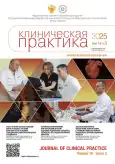The tactics of weaning from cardiopulmonary bypass with blood-saving technique in cardiac surgery
- Authors: Kireev Y.P.1, Klypa T.V.2, Mandel I.A.2,3, Sungurova D.S.1, Yanovskaya I.M.2, Shepelyuk A.N.1
-
Affiliations:
- Federal Clinical Center for High Medical Technologies of the Federal Medical and Biological Agency
- Federal Research and Clinical Center of Specialized Medical Care and Medical Technologies
- The First Sechenov Moscow State Medical University
- Issue: Vol 16, No 3 (2025)
- Pages: 38-46
- Section: Original Study Articles
- URL: https://journals.rcsi.science/clinpractice/article/view/352029
- DOI: https://doi.org/10.17816/clinpract685114
- EDN: https://elibrary.ru/DNBUCC
- ID: 352029
Cite item
Abstract
BACKGROUND: Cardiac surgery under cardiopulmonary bypass is typically characterized by significant blood loss and the need for donor red blood cell transfusions. In addition to the inflammatory response, hemodilution, hypocoagulation, and blood loss significantly contributes to the development of perioperative anemia associated with the weaning from the cardiopulmonary bypass. AIM: Optimization of weaning from cardiopulmonary bypass to reduce blood loss during cardiac surgery. METHODS: Patients undergoing cardiac surgery under cardiopulmonary bypass (n=62) were divided into two groups. In the study group (n=31), all blood from cardiopulmonary bypass circuit was returned to the patient's central vein at the end of the cardiopulmonary bypass. In the comparison group (n=31), a standard method of pushing a residual blood volume from the cardiopulmonary bypass circuit with normal saline was used. Laboratory and instrumental data were analyzed. RESULTS: Intraoperative blood loss in the study group was significantly lower than in the comparison group (500 [470–520] ml versus 800 [760–830] ml, p=0.0001). Twenty-four hours after surgery, creatinine, alanine aminotransferase, and amylase concentrations were higher in the study group than in the comparison group. At the end of surgery, the study group also had higher cardiac index (3.1 [2.8–3.6] versus 2.8 [2.6–3.1] l/m2 per minute, p=0.018) and global ejection fraction (28 [22–31] versus 22 [19–24]%], p=0.011). No adverse events or reactions were registered during the study. CONCLUSION: Complete blood return after cardiopulmonary bypass results in higher hemoglobin and hematocrit levels in the early postoperative period, accompanied by less blood loss and higher cardiac index and global ejection fraction after the main stage of the surgery without significant adverse events.
Full Text
##article.viewOnOriginalSite##About the authors
Yaroslav P. Kireev
Federal Clinical Center for High Medical Technologies of the Federal Medical and Biological Agency
Email: yarikkireev@yandex.ru
ORCID iD: 0000-0002-5389-0874
SPIN-code: 8997-8962
MD
Russian Federation, KhimkiTatiana V. Klypa
Federal Research and Clinical Center of Specialized Medical Care and Medical Technologies
Email: tvklypa@gmail.com
ORCID iD: 0000-0002-2732-967X
SPIN-code: 2349-8980
MD, PhD, Professor
Russian Federation, MoscowIrina A. Mandel
Federal Research and Clinical Center of Specialized Medical Care and Medical Technologies; The First Sechenov Moscow State Medical University
Author for correspondence.
Email: imandel@mail.ru
ORCID iD: 0000-0001-9437-6591
SPIN-code: 7778-2184
MD, PhD
Russian Federation, 28 Orekhovy blvd, Moscow, 115682; MoscowDaria S. Sungurova
Federal Clinical Center for High Medical Technologies of the Federal Medical and Biological Agency
Email: sungyr@yandex.ru
ORCID iD: 0009-0000-8492-1605
Russian Federation, Khimki
Irina M. Yanovskaya
Federal Research and Clinical Center of Specialized Medical Care and Medical Technologies
Email: i.janowska@yandex.ru
ORCID iD: 0000-0001-8578-4710
SPIN-code: 3722-1070
Russian Federation, Moscow
Alexandr N. Shepelyuk
Federal Clinical Center for High Medical Technologies of the Federal Medical and Biological Agency
Email: shepeliuk77@yandex.ru
ORCID iD: 0009-0002-3921-7509
SPIN-code: 9614-5874
MD, PhD
Russian Federation, KhimkiReferences
- Bert AA, Steams GT, Feng W, Singh AK. Normothermic cardiopulmonary bypass. J Cardiothorac Vasc Anesth. 1997;11(1):99–106. doi: 10.1016/s1053-0770(97)90262-7
- Perrino AC, Jr, Falter F, Baker RA. Cardiopulmonary bypass. 3rd ed. Cambridge Academ; 2022. 288 р. ISBN: 9781009009621
- Shander A, Corwin HL, Meier J, et al. Recommendations from the International Consensus Conference on Anemia Management in Surgical Patients (ICCAMS). Ann Surg. 2023;277(4):581–590. doi: 10.1097/SLA.0000000000005721 EDN: LTDHYL
- Bhaskar B, Dulhunty J, Mullany DV, Fraser JF. Impact of blood product transfusion on short and long-term survival after cardiac surgery: more evidence. Ann Thorac Surg. 2012;94(2):460–467. doi: 10.1016/j.athoracsur.2012.04.005
- De Santo LS, Amarelli C, Della Corte A, et al. Blood transfusion after on-pump coronary artery bypass grafting: focus on modifiable risk factors. Eur J Cardiothorac Surg. 2013;43(2):359–366. doi: 10.1093/ejcts/ezs223
- Kunst G, Milojevic M, Boer Ch, et al. 2019 EACTS/EACTA/EBCP guidelines on cardiopulmonary bypass in adult cardiac surgery. Br J Anaesth. 2019;123(6):713–757. doi: 10.1016/j.bja.2019.09.012 EDN: FHKIMC
- Reyhancan A, Büyükadalı M, Koçak E, et al. Use of cell saver in elective coronary bypass surgery: what do we risk when saving blood? J Clin Med. 2025;14(12):4230 doi: 10.3390/jcm14124230
- Kochar A, Zheng Y, van Diepen S, et al. Predictors and associated clinical outcomes of low cardiac output syndrome fol-lowing cardiac surgery: insights from the LEVO-CTS trial. Eur Heart J Acute Cardiovasc Care. 2022;11(11):818–825. doi: 10.1093/ehjacc/zuac114 EDN: GKONDS
- Ferreira LO, Vasconcelos VW, de Sousa Lima J, et al. Biochemical changes in cardiopulmonary bypass in cardiac surgery: new insights. J Pers Med. 2023;13(10):1506. doi: 10.3390/jpm13101506 EDN: PEJFIM
- Bolliger D, Tanaka KA. More is not always better: effects of cell salvage in cardiac surgery on post-operative fibrinogen concentrations. J Cardiothorac Vasc Anesth. 2020;34(9):2383–2385. doi: 10.1053/j.jvca.2020.03.032 EDN: XDNTCB
- Woodman RC, Harker LA Bleeding complications associated with cardiopulmonary bypass. Blood. 1990;76(9):1680–1697.
- Xie CM, Yao YT, Yang K, et al.; Evidence in Cardiovascular Anesthesia (EICA) Group. Furosemide does not reduce the incidence of postoperative acute kidney injury in adult patients undergoing cardiac surgery: a PRISMA-compliant systematic review and meta-analysis. J Card Surg. 2022;37(12):4850–4860. doi: 10.1111/jocs.17120 EDN: KZCISE
Supplementary files






